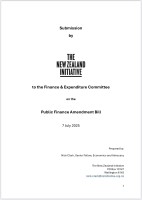Ellis v R: revolution by judicial decree
Supreme Court Matters: Revolution by Judicial Decree A Review of Professor Peter Watts KC’s “Ellis v R: A Revolution in Aotearoa New Zealand, Welcome or Not” Revolutions conjure images of violent uprisings, the storming of institutions, and the forcible overthrow of existing orders. But constitutional foundations can be destroyed through more subtle means. Read more











